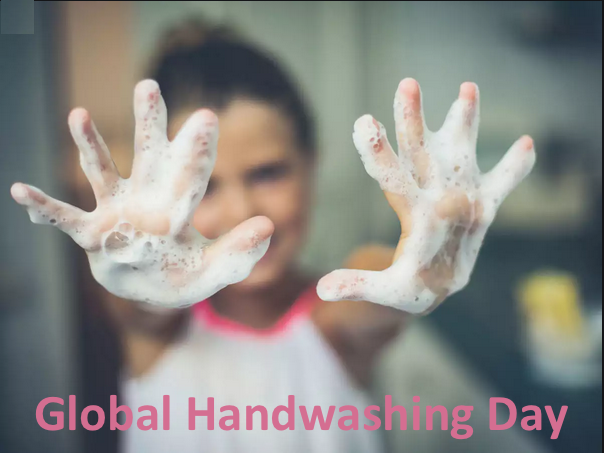Global Handwashing Day is an annual global advocacy day dedicated to advocacting for handwashing with soap as an easy, effective, and affordable way to prevent diseases and save lives. “Hand Hygiene for All” is the theme of this year’s Global Handwashing Day, following a recent World Health Organization initiative calling for improved hand hygiene. Global Handwashing Day was established by the Global Handwashing Partnership.
The first Global Handwashing Day was held in 2008, when over 120 million children around the world washed their hands with soap in more than 70 countries. Everyone can protect themselves, their families, and their communities through handwashing with soap. Though it requires few resources—soap and a small amount of water—the benefits are significant. Handwashing with soap helps prevent the spread of infections including influenza and Ebola.
Keeping our hands clean is one of the simplest and most important habits we can adopt to prevent contracting Covid-19 and spreading the coronavirus that causes the disease to others. Without washing properly and killing off the coronavirus — and other viruses, bacteria and germs we pick up from raw meats, fecal matter and respiratory droplets — it can spread between people and cause disease.
Be grateful you can wash your hands.
There are 818 million children who don’t have access to basic handwashing with water and soap at school. At least 3 billion people, or 40% of the world’s population, do not have a handwashing facility with soap and water at home.
Handwashing with soap is an easy, effective, affordable do-it-yourself practice that prevents infections and saves lives.
Just Do It!…please
How Germs Spread
Washing hands can keep you healthy and prevent the spread of respiratory and diarrheal infections from one person to the next. Germs can spread from other people or surfaces when you:
- Touch your eyes, nose, and mouth with unwashed hands
- Prepare or eat food and drinks with unwashed hands
- Touch a contaminated surface or objects
- Blow your nose, cough, or sneeze into hands and then touch other people’s hands or common objects
Key Times to Wash Hands
You can help yourself and your loved ones stay healthy by washing your hands often, especially during these key times when you are likely to get and spread germs:
- Before, during, and after preparing food
- Before eating food
- Before and after caring for someone at home who is sick with vomiting or diarrhea
- Before and after treating a cut or wound
- After using the toilet
- After changing diapers or cleaning up a child who has used the toilet
- After blowing your nose, coughing, or sneezing
- After touching an animal, animal feed, or animal waste
- After handling pet food or pet treats
- After touching garbage
Follow Five Steps to Wash Your Hands the Right Way
Washing your hands is easy, and it’s one of the most effective ways to prevent the spread of germs. Clean hands can stop germs from spreading from one person to another and throughout an entire community—from your home and workplace to childcare facilities and hospitals.
Follow these five steps every time.
- Wet your hands with clean, running water (warm or cold), turn off the tap, and apply soap.
- Lather your hands by rubbing them together with the soap. Lather the backs of your hands, between your fingers, and under your nails.
- Scrub your hands for at least 20 seconds. Need a timer? Hum the “Happy Birthday” song from beginning to end twice.
- Rinse your hands well under clean, running water.
- Dry your hands using a clean towel or air dry them.
Worried about dry hands? After washing your hands, simply pat them dry with a clean towel but leave them slightly damp “to lock in the moisture” from ointments and creams that you’ll work into your skin, fingertips and nails.\

